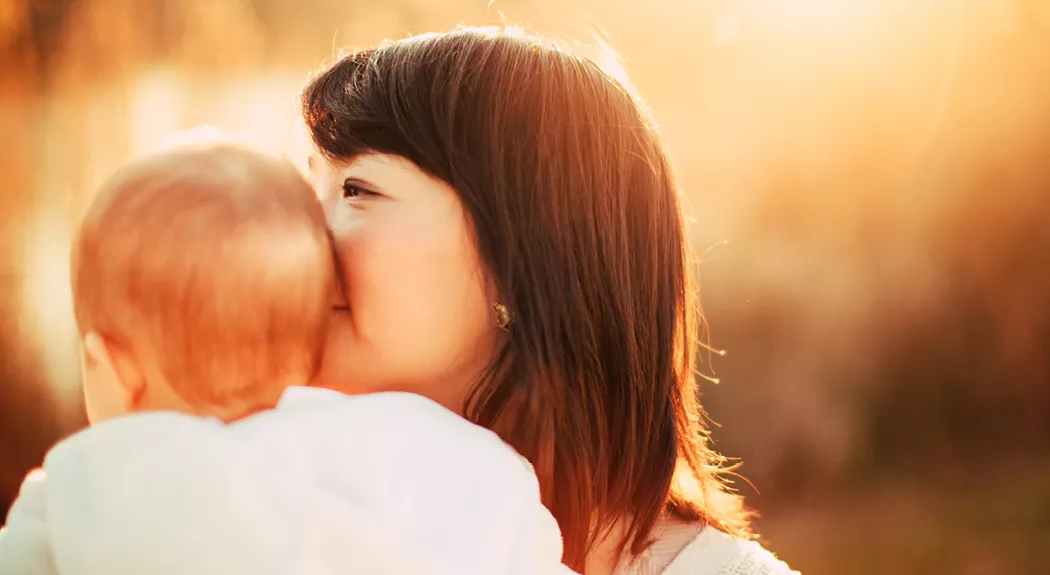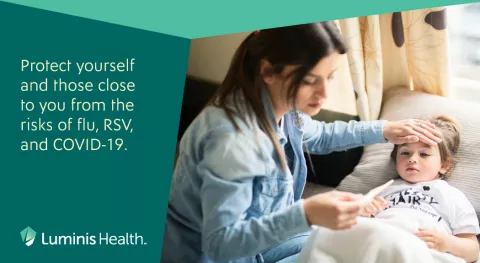
Hugs and kisses, diaper changes and snuggles — caring for babies and toddlers is often hands-on, up close and personal. But since we know that even little ones can get and transmit COVID-19 and other respiratory viruses like respiratory syncytial virus (RSV), what’s the best way to keep your family healthy? Here are a few suggestions.
Avoid germ-sharing when you can
Young children often explore the world with their hands and mouths, and regularly come in close contact with their other family members. That means they’re not only likely to pick up all kinds of viruses through their activities; it also means they are very likely to spread it. In fact, a recent study found that once infected with COVID, babies and kids up to age three had higher odds of transmitting the virus to other members of their household than older kids.
To help protect your baby:
- Don’t let people outside your household kiss or hold your baby
- Limit visitors to your home and avoid trips to crowded places
- When you have to go out in public, drape a light blanket over your baby’s carrier or stroller
To help toddlers dodge extra germs:
- Choose outdoor gatherings when possible
- Make sure visitors are healthy and wash their hands before interacting with your child
- Pack extra toys for playdates so you can always have clean ones on hand
- Wipe down grocery store cart handles before placing your child in the seat
Talk to your childcare providers
In daycare settings, it’s not usually possible to keep physical distance between young children. And since kids under two shouldn’t wear masks, talk to your care providers about how to layer prevention plans. Some strategies you might ask about include:
- If there are lots of children at your daycare, your provider might be able to place kids into smaller groups or cohorts to stay with throughout the day. This practice limits how many other kids and staff your child gets close to on an everyday basis.
- Disease-control best practices. Find out what steps your daycare takes to avoid virus transmission, in addition to handwashing and cleaning practices. For example, they might be able to place nap mats head-to-toe while sleeping, improve ventilation with window fans, allow more space between children at mealtimes or move drop-off and pick-up outdoors.
- Sick-child policy. Kids and staff who show symptoms of COVID should stay home to avoid spreading illness. Your daycare can also designate an isolation area where kiddos showing symptoms can play while they wait for their parents.
Keep it healthy at home
Our best protection against severe COVID illness is to be fully vaccinated, so all members of your family who are eligible for the vaccine should get it. There are also other steps you can take:
- When breastfeeding. Mothers can pass along immune benefits to their babies through breast milk, so consider breastfeeding or pumping breastmilk for bottles if it’s an option for your family.
- During doctor’s visits. Keep up with well visits and vaccines at your pediatrician’s office. Many doctors take steps to limit contact between well and sick kids. Especially for babies and toddlers, it’s essential to have regular check-ups and stay on your child’s vaccine schedule.
- When around others. Encourage all members of your family and older siblings to keep up with good handwashing routines. Key times include when you get home and before mealtimes. Also, remind everyone in your home to cough and sneeze into their elbow and throw away soiled tissues. And keep sick family members separated from healthy ones when possible.
Right now, it makes sense to take these precautions. Luckily, most cases of COVID in children are mild. However, some children have experienced more serious complications. These measures will also help you steer clear of other respiratory viruses, like RSV, which can turn into a severe illness. Every year, nearly 60,000 children under five are hospitalized due to RSV infection.
The littlest members of your family are worth protecting. If you think your baby or toddler has virus symptoms or might be sick with COVID or RSV, call your pediatrician for advice.
Lauren Fitzpatrick, MD, medical director of the Pediatric Emergency Department and Inpatient Unit, Luminis Health Anne Arundel Medical Center
Suzanne Rindfleisch, DO, director of Newborn Services, Luminis Health Anne Arundel Medical Center



